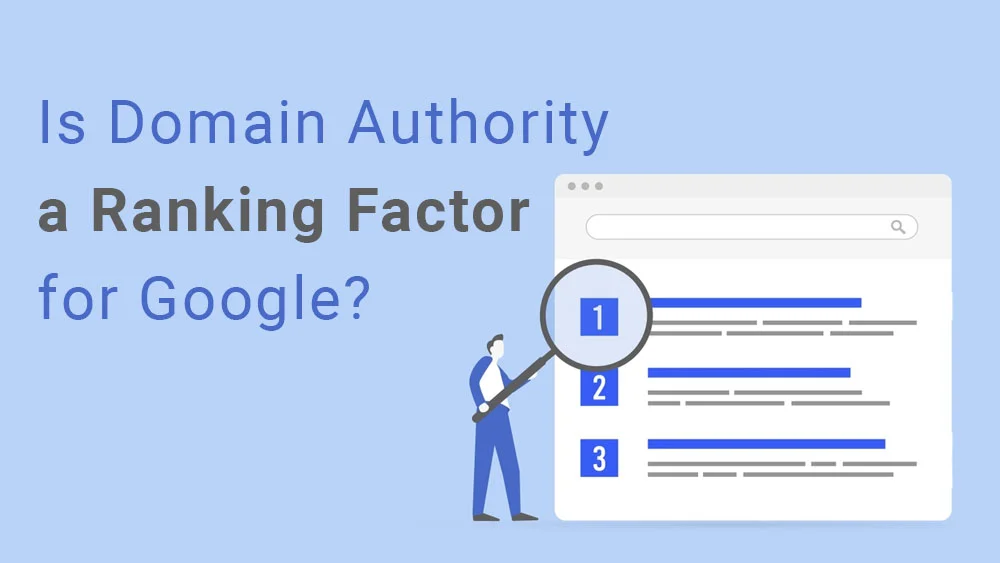This is a question for all the people out there asking it. People who are interested in knowing how they can rank on Google through their domain authority rates. When it comes to search engine optimization (SEO), domain authority is a term that often comes up. But what exactly is domain authority, and does it really have an impact on Google ranking? In this post, we’ll explore the relationship between domain authority and Google ranking. That is to help you better understand how to improve your website’s search engine visibility.
What Is Domain Authority?
Moz, which is one of the first and most trusted SEO companies, is responsible for developing “domain authority.” This metric forecasts how well a website will do in the search engine result pages (SERPs). It is determined by analyzing a number of aspects. These aspects include the quantity and quality of links pointing to a website, the length of time a domain has been registered. In addition to the trustworthiness of the website as a whole. When a website has a high domain authority, it has a better chance of ranking well. These ranks are on search engine results pages (SERPs). When determining the rankings of websites, domain authority is just one of many aspects that Google takes into consideration. This fact should not be overlooked.
The Domain Authority Process: A Calculation Strategy
The calculation of a website’s domain authority uses a complicated algorithm. One that takes into account a wide range of different aspects. Some of the most important aspects that you should take into account are:
- The age of the domain
- The number and quality of inbound connections
- The overall credibility of the website
When determining a website’s domain authority, Moz employs a secret algorithm. One that uses a scale ranging from one to one hundred. When a website has a high domain authority, it has a better chance of ranking highly. It will do so on the pages on which search engines display their results. However, it is vital to know that Google takes into consideration a wide variety of variables when ranking websites. Domain authority is just one of those aspects. It is important to keep in mind that Moz is not the only search engine optimization tool that has established a metric for determining the authority of a website. Other domain authority or SEO platforms include:
- Ahrefs: The Ahrefs rank and domain rating are both available through this tool or platform. While Domain Rating rates the strength of a website’s backlink profile in relation to other websites in the Ahrefs database on a scale of 100, AR ranks websites in the Ahrefs database according to the quantity and quality of their backlinks.
- Semrush (an SEO tool): Semrush’s Authority Score evaluates a domain’s or webpage’s overall quality and SEO performance.
- Majestic: Majestic’s flow metric scores assess the number of links and the quality of the content on a website.
Does Domain Authority Directly Impact Google Ranking?
Although Google does take domain authority into consideration when ranking websites, there is no guarantee that the two are directly related. Additionally, there is no guarantee that a website with a higher domain authority will rank higher than a website with a lower domain authority. Google employs a sophisticated algorithm that takes into account a wide variety of criteria. It is by mere chance that they may be connected or related if certain factors that Google has set are actually covered by the domain. This variety of criteria includes relevance, the quality of the material, and the user experience. Although having a high domain authority can undoubtedly help enhance a website’s ranking, it is important to keep in mind that this is not the only element that plays a role. We’re emphasizing this point specifically because a lot of people link domain authority directly with Google ranking. Which is kind of a myth that we’re debunking.
What Other Factors Are Important for Google Ranking?
Google ranks webpages in its search results using a sophisticated algorithm. Google considers more than 200 ranking variables; however, a few of the most crucial ones are the following:
- Material quality: An important ranking criteria for websites is the caliber of their material. Google prefers websites that offer excellent, educational, and unique material that is pertinent to a user’s search query.
- Backlinks: Links pointing to your website from other websites are a significant ranking element. When ranking websites, Google takes both the quantity and quality of backlinks into account. Websites with relevant backlinks from reputable sources are more likely to appear higher on search engine results pages.
- User experience: Google gives the user experience a lot of weight. Easy-to-navigate, quick-loading, and mobile-friendly websites are more likely to appear higher in search results.
- On-page optimization: Using keywords, meta descriptions, and page titles are a few examples of on-page elements that may be improved on a website. By improving these variables, a website’s ranking and Google’s comprehension of its content can both be enhanced.
- Social signals: When ranking webpages, Google takes into account social signals like likes, shares, and comments on social media. A strong social media presence increases the likelihood that a website will appear higher in search results.
- Domain authority: A website’s domain authority is a gauge of its specialty authority. Higher search result placement is more likely for websites with strong domain authority.
- Local SEO: Local SEO is essential for companies with physical locations. Google gives preference to websites that provide reliable and consistent information about their company on their website and in other online directories, such as their address, phone number, and operating hours.
A Summary for the Importance of Google’s Factors

These are a few of the most crucial elements or factors that might affect how well a website performs in Google search results. It’s crucial to keep in mind, though, that Google’s algorithm is continually changing and new ranking variables may appear in the future. That is a result of Google’s updates to their system and algorithms to keep providing developers and users with the best options and services.
How Can You Improve Your Domain Authority?

The amount of authority or domain power that a website has can be determined by looking at its domain authority rates. It depends on a number of variables, including the relevance of the content, the quantity and quality of backlinks, and the overall user experience. Your website may rank better in search results with improved domain authority, which may bring in more visitors, leads, and sales. The following advice can help you raise your domain authority:
- Produce high-quality content: Improving your domain authority requires producing high-quality, educational, and unique material that is pertinent to the interests and requirements of your target audience. Backlinks from other websites may result from doing this, which may increase your authority.
- Create high-quality backlinks: One of the best approaches to raising your domain authority is to create high-quality backlinks from reliable websites in your area. Producing linkable content, requesting links from other websites, and engaging in guest blogging and other content marketing strategies are all ways to achieve this.
- Improve on-page elements: By using keywords, meta descriptions, and page titles, you may help Google better understand the content of your website and raise its position by optimizing on-page features.
- Enhance the user experience: Increasing engagement and lowering bounce rates can help raise your domain authority. To achieve this, make your website mobile-friendly, simple to use, and quick to load.
- Promote your website on social media: By promoting your website on social media, you may raise your brand’s visibility, improve site traffic, and gain backlinks from other websites.
- Track your success over time by monitoring your metrics: Metrics for your website, such as traffic, bounce rate, and engagement, can help you find areas for improvement.
Final Thoughts
So now that you know that the answer is a semi-no to the topic’s question, Google ranking doesn’t have a direct link to one’s domain authority. In other words: domain authority is not a Google ranking factor that should be considered deeply while developing your SEO strategy. That is why it is important to know all the factors that Google has in its algorithms in order to make sure that your platform or domain will actually rank on Google’s search page. Increasing your domain authority is a process that takes time and persistent work to complete. You can gradually increase your website’s authority and visibility in search results by paying attention to these suggestions. If it is your wish to know more about how to rank on Google and begin link building and exchange, you’ve come to the right place. Linkexchange.AI is the best platform that will help you exchange links easily and in a hassle-free manner. Sign up now; it is free and available to help link you with the right channels and networks out there!








